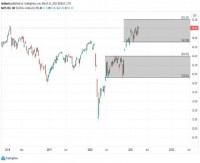|
Opalesque Industry Update - More than half of institutional investors are still uncomfortable with quantitative investment strategies, suggests a survey by Cambridge Associates, the global investment firm. Cambridge Associates says many investors are still sceptical of the benefits of quantitative strategies, despite lower-cost quant funds generating comparable returns to traditional 'human-led' active management strategies. A survey of Cambridge Associates clients revealed: * Half of investors surveyed find it difficult to make hiring and firing decisions on quantitative strategies * A majority of investors have no plans to increase their exposure to quantitative strategies * The biggest reason given for avoiding quantitative strategies is a perceived lack of transparency Traditional criticisms of algorithmic investment strategies include a perception that they are subject to high trading costs, and tend to crowd into the same investment positions, leading to the risk of crashes. However, Cambridge Associates believes investors may want to be much more open to quantitative investment strategies, as they have generated similar returns to 'human-led' active management strategies, with lower fees. The median global equity fund fees for quant strategies is 55bps, compared with 75bps for 'fundamental' human-managed investment strategies. Quantitative investment strategies use algorithms that can express the typical strategies used by active fund managers very efficiently. But algorithms have the major benefit of not suffering from subconscious human biases, as they will not invest in anything that does not fall within the pre-set parameters. Cambridge Associates say that whilst traditional discretionary managed funds are best placed for longer term and more idiosyncratic investments, investors should analyse where the value is really being added before choosing an investment strategy. Simon Hallett, Co-Leader of Cambridge Associates European Endowments & Foundations, says: "Quant funds should be seriously considered by institutional investors looking for similar returns to human-managed funds with lower fees." "However it is clear that quantitative fund managers still have more work to do to market their funds and the benefits of them to institutional investors." "Quant strategies are frequently criticised as lacking transparency. Although this may be true in a few cases, many can write down for you exactly how decisions are made and on what data. By contrast, how much can you really know about what is going on in the head of a human portfolio manager as he/she frets over whether to cut or double down on a losing position?" "Quantitative funds are not a broad substitute for actively managed portfolios. However there are a number of investments, particularly exchange traded assets, where quantitative strategies can both replicate and outperform their human rivals at a lower cost." "Research in behavioural psychology in recent years suggests that subconscious biases may act against us as investors, which can give quantitative strategies an edge." "Ultimately, institutional investors in the long run are seeking high returns, and if quant strategies are able to consistently outperform discretionary managed funds, then investors reservations about them will decline." |
Industry Updates
More than half of institutional investors are still uncomfortable with quant strategies
Monday, September 17, 2018
|
|





 RSS
RSS







